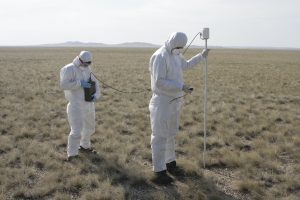The Treaty on the Prohibition of Nuclear Weapons (TPNW), the first legally binding international document that establishes a universal and comprehensive ban on nuclear weapons, was adopted in July 2017 with the support of 122 (out of 193) UN member states and opened for signature in September 2017. To enter into force, the treaty requires ratification by 50 states. To date, 79 states have signed and 33 have ratified the document.
Proponents of the TPNW regard it as a historic achievement that would lead toward the total elimination of nuclear weapons. At the same time, five de jure and four de facto nuclear-weapon states stand opposed to the treaty, as do the so-called umbrella states that rely on extended nuclear deterrence for protection, including such prominent advocates of nuclear disarmament as Australia, Canada, Japan, and Norway. Opponents of the treaty argue that it is unrealistic and undermines the long-standing nuclear nonproliferation regime. Some also claim that by delegitimizing nuclear deterrence, the TPNW would erode its credibility and push nuclear-reliant countries to acquire nuclear weapons of their own.
Kazakhstan, a country that once possessed nuclear weapons and voluntarily renounced them, signed the treaty in March 2018 and deposited the ratification instrument with the UN Secretariat in August 2019. To emphasize both the importance and symbolism of the event, the ceremony took place on August 29, the International Day against Nuclear Tests, which was officially commemorated for the 10th time this year. It was on that day in 1949 that the first Soviet atomic bomb was tested on Kazakh soil, at the Semipalatinsk nuclear test site; and on that day in 1991 Kazakhstan’s then-President Nursultan Nazarbayev signed the decree closing the test site. Thus, for Kazakhstan, approving the nuclear ban treaty was a natural choice; for the treaty’s adherents Kazakhstan’s participation serves to strengthen the validity of the TPNW.
However, Kazakhstan’s commitment to banning nuclear weapons has been questioned by some who assert that its indirect involvement in nuclear weapon-related activities invalidates the nuclear ban treaty. This line of argument is based on two interrelated premises: First, Kazakhstan, as a member of the Moscow-led Collective Security Treaty Organization (CSTO), relies on the Russian nuclear deterrent; second, by allowing its nuclear-armed ally, Russia, to carry out missile defense testing on its territory, Kazakhstan violates certain provisions of the TPNW.
Are these charges legitimate?































